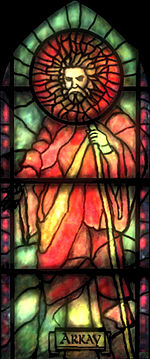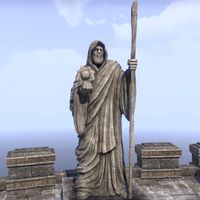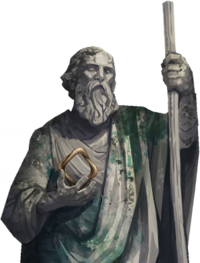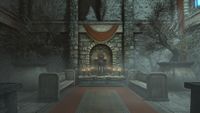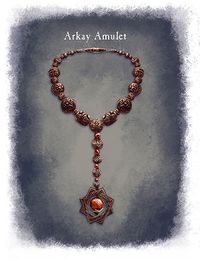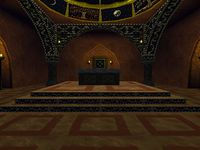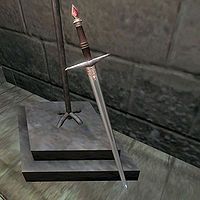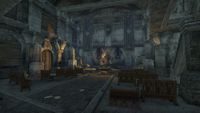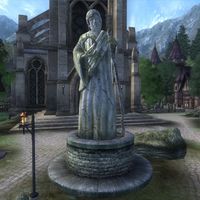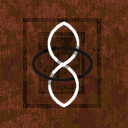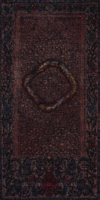Lore:Arkay
—Ten Commands: Nine Divines
Arkay (or Ark'ay), known as the Lord of the Wheel of Life,[1] God of the Cycle of Birth and Death,[2] Light of Lights, the Bringer of Light,[3], and Lord of the Seasons[4] is a member of the Divines, and also a popular god in other cultures. Arkay is often more important in those cultures where his father, Akatosh, is either less related to time or where his time aspects are difficult to comprehend by the layman.[5] He is the god of burials and funeral rites, and is generally associated with cyclical occasions, such as the seasons and life/death.[6] His priests are staunch opponents of necromancy and all forms of the undead, and are empowered to bestow Arkay's blessings which prevent the forceful misuse of a mortal soul.[1] Thus, any body properly buried by a priest observing the proper rituals is protected by Arkay's Law from being raised as undead.[7] Therefore, necromancers view Arkay as their ultimate enemy, and make covert efforts to undermine his worship throughout Tamriel.[8] Because of this association with, and protection of, mortality, he is sometimes called the Mortals' God.
Worship[edit]
The Order of Arkay has temples in Sentinel, Ilessan Hills, Shalgora, Dragontail Mountains, and Orsinium.
Followers of Arkay are known as Arkayns.[9]
Bosmer[edit]
Arkay is the god of burials, funeral rites and is associated with the seasons. The Bosmer invoke him when solving offenses against the Green Pact.[10][11]
Breton[edit]
One legend of Arkay's origins told by the Bretons is written in the book Ark'ay The God. It states that Arkay was once a mortal shopkeeper with a passion for knowledge. He found a book written in a strange language and spent years upon years attempting to decipher it, slowly ignoring everything and everyone else around him. Eventually Arkay realized the book explained life and death itself, but by this time was at death's door with an incurable plague. Praying to Mara as a last resort, Arkay asked for more time to interpret the book. Mara gave him a choice: die now or become a god for eternity, charged with keeping the balance of death and life in the universe.[12][5][8]
Small stone talismans resembling eyes shut in eternal rest, known as closed eyes of Arkay are often given to mourning families.[13]
Because of his duty to maintain balance, Bretons believe Arkay may cause plague, famines and other natural disasters and so fear him as well as love him.[14]
Imperial[edit]
Another theory of Arkay's origins is contained in The Monomyth, which suggests that Arkay was one of the very first spirits to "crystallize" after the start of time.[15]
Nord[edit]
The original Nordic aspect of Arkay was Orkey, a testing god associated with the Snake that governed death and enjoyed quarrels of all kind.[16] Orkey seems to have some association with Malacath and Orcs, a notable legend saying Orkey cursed the Nords (who previously were as long-lived as Elves) down to lifespan of six years before Shor lifted the curse and threw most of it onto the Orcs.[17]
The shift from Orkey to Arkay happened with the Alessian Reforms that fused aspects of the Elven and Nordic Pantheons being embraced in much of Skyrim.[citation needed]
Shrines to Arkay can be found in Halls of the Dead across Skyrim, it is his shrine Nords pray to when they visit the Hall. That his divinity will watch over their ancestors on the way to the next life.[18]
Nordic priests of Arkay perform rites for the dead and sometimes console the bereaved, they also keep a constant vigil against those who practice the vile arts of necromancy.[19]
Reachfolk[edit]
After imperialization and the loss of independence, some Reachmen embraced the worship of the Eight Divines, including Arkay, believing that certain aspects of their traditional practices were best left in the past.[20][21][22]
Redguard[edit]
In Hammerfell, where worship of Arkay is strongest, the dead are almost always subject to Arkay's Law. There are exceptions after large battles or in remote areas where death occurs far from priests.[7] Redguard followers of Arkay see him as the shepherd of the soul, who watches through lives and deaths, and guides one between them in the heavenly interim.[9]
Some sources connect Arkay with Tu'whacca through the early Nedic precursor To-Arcka. Indeed, symbolism strikingly similar to Arkay's wreath appears on many ancient Yokudan tombs.[23] Tu'whacca's cult is sometimes associated with Arkay in the more cosmopolitan regions of Hammerfell, and he is often worshiped in that name by Forebears.
One source has conflated Arkay with the Yokudan goddess Morwha in the past although it's unknown if this was speaking to a true connection or was simply a scholarly mistake.[24]
Artifacts[edit]
Lady Garick's Sacred Shield[edit]
Lady Joslin Garick was a premier Breton captain for the All Flags Navy. Aside from her exploits, she was known for what she referred to as her "Sacred Shield". She claimed her eponymous ward was blessed by a saint of Arkay, though long after her passing, legends would paint it as Arkay himself that endowed his power into it. The shield was said to preserve the wielder's life, in that no injury would befall them. The legends seemed to have some merit, for her crew would always return safely. However, the one instance she left her shield behind for safe keeping was her last voyage, as she and her crew met their demise during the All Flags Navy's assault on Thras.
Sword of the Crusader[edit]
The Sword of the Crusader was created by Arkay. Those it strikes are burnt by holy flames, and their magicka reserves depleted. It was discovered by Sir Berich Vlindrel of the original Knights, who brought it to the War of the Red Diamond. When he died, it was buried with him in his family tomb in Underpall Cave; in undeath, Lord Vlindrel dragged the sword down into evil, cursing it so that a righteous wielder would have stunted magicka. His wraith, infamous for haunting the Orange Road, wielded the weapon. It was recovered by the pilgrim who, after freeing Lord Vlindrel's soul, reconsecrated it on the altar in the Great Chapel of Arkay in Cheydinhal.[25]
Saints of Arkay[edit]
Ellenica[edit]
Saint Ellenica was a Breton priestess of Arkay.[26] Her prayer book is a holy relic, and contains passages that can be read to put the dead to rest.[27] She was buried in Flyleaf Catacombs with her prayer book, which was retrieved in 2E 582.[28]
Errandil[edit]
Saint Errandil was a High Elf saint affiliated with Arkay. He was the Great Chapel of Arkay's chief crusader against the practice of necromancy in the Mages Guild and the Imperial Battle College,[29] he was killed by Umaril the Unfeathered's Aurorans in 3E 433.[30]
Marben[edit]
Saint Marben was a Breton saint affiliated with Arkay.[26][31] Saint Marben's Fingerbone is a holy relic of Arkay, and was buried at Sanguine Barrows until it was retrieved in 2E 582.[32][33]
Octavien[edit]
Saint Octavien was a priest of Arkay. Little is known about his life, but more is known about his death and legacy. He was killed by Daedra worshippers with a scythe. His death has been remembered by the Bretons, and the scythe has become a holy relic of Arkay. The damaged weapon was preserved in the Lorkrata Hills, and a piece of it was retrieved by the knights in 2E 582 to combat the undead armies that assaulted Rivenspire.
Bronze talismans depicting the image of Saint Octavien were a common form of his representation.
Planet[edit]
The planet Arkay, sometimes called RKHET, is one of the Dominion Planets in the skies of Mundus, and according to the Warrior-Poet, Vivec, it is one of the eight worlds known to the Dwemer. No other planet orbits Arkay. Arkay marks the eye of the Thief constellation. As with all astral bodies seen in the skies above Nirn and their corresponding deities, the planet Arkay is believed to be the plane of the god Arkay as well as the god himself, as seen from the mortal plane. It is said to actually be a different plane of existence in its own right, infinite in size and mass, with its appearance as a sphere being only a visual phenomenon caused by mortal mental stress. Though scholars largely agree no mortal beings live on Arkay or Akatosh, Azandar al-Cybiades theorized that the power Ayleid Wells reroute back towards the heavens was being collected by someone.
Gallery[edit]
Notes[edit]
- The Illusion of Death suggests that the cycle of life and death is also called the "Arkayn Cycle".
- Arkay's lash, a cactus with a bright pink flower that has great medicinal properties, is named after Arkay.[34]
- Arkay was named after one of the original Daggerfall beta testers, R. K. Deutsch, who died in 1998.
- The word for "relating to Arkay" is "Arkayn".[35][23]
- Florentius Baenius was a 4th Era Priest of Arkay associated with the Dawnguard that claimed to directly hear the voice of Arkay. Though his colleagues were deeply skeptical of this, his supposed connection to Arkay still seemed to give him access to knowledge he should not otherwise possess.
- Various poisons in Skyrim have Arkay's symbol on their label.
See Also[edit]
Books[edit]
- Arkay the Enemy by KW — Instructions for the faithful to foil Arkay
- Ark'ay The God by Mymophonus the Scribe — How Ark'ay was transformed from a shopkeeper into the God of Birth and Death
- Tu'whacca, Arkay, Xarxes by Lady Cinnabar of Taneth — A discussion on the similarity of gods
- The Consecrations of Arkay by Punctilius Tyrus — The beliefs and practices of the Order of Arkay
References[edit]
- ^ a b The Consecrations of Arkay — Punctilius Tyrus
- ^ The Daggerfall Chronicles — Ronald Wartow
- ^ Priest of Arkay's dialogue in Oblivion
- ^ Master Pellingare's dialogue in ESO
- ^ a b Varieties of Faith... — Brother Mikhael Karkuxor of the Imperial College
- ^ Opusculus Lamae Bal ta Mezzamortie — Mabei Aywenil, Scribe
- ^ a b Corpse Preparation v I
- ^ a b Arkay the Enemy — KW
- ^ a b Nidal's dialogue in Redguard
- ^ The Improved Emperor's Guide to Tamriel: Valenwood — Flaccus Terentius, 2E 581
- ^ Varieties of Faith: The Wood Elves — Brother Mikhael Karkuxor of the Imperial College
- ^ Ark'ay The God — Mymophonus the Scribe
- ^ The Closed Eye of Arkay item description in ESO: High Isle
- ^ Priest Colby Rangouze's dialogue in ESO
- ^ The Monomyth
- ^ The Song of Gods
- ^ Varieties of Faith: The Nords — Brother Mikhael Karkuxor of the Imperial College
- ^ Brother Verulus' dialogue in Skyrim
- ^ Andurs' dialogue in Skyrim
- ^ Belchimac's dialogue in Skyrim
- ^ Cedran's dialogue in Skyrim
- ^ Degaine's dialogue in Skyrim
- ^ a b Tu'whacca, Arkay, Xarxes — Lady Cinnabar of Taneth
- ^ The Redguard Companion
- ^ The Sword of the Crusader quest in Oblivion: Knights of the Nine
- ^ a b Alvaren Garoutte's dialogue in ESO
- ^ Saint Ellenica's Prayer Book quest item description in ESO
- ^ Matthiaume's Journal — Matthiaume
- ^ Guide to Cheydinhal — Alessia Ottus
- ^ Errandil in Oblivion
- ^ Edweg's Resignation Note — Edweg
- ^ Edweg's dialogue during Archaic Relics in ESO
- ^ Saint Marben's Fingerbone quest item description in ESO
- ^ Iokkas' dialogue in ESO
- ^ The Illusion of Death
Note: The following references are considered to be unofficial sources. They are included to round off this article and may not be authoritative or conclusive.
| |||||||||||
| ||||||||||||||||||||||||||
| |||||||||||||||||||||||
| |||||||||||
| ||||||||||||||||||||||||||||||
| ||||||||||||||||||||||||||||||||||||
